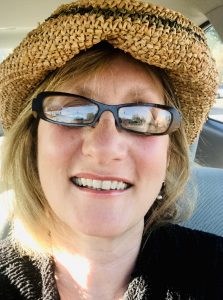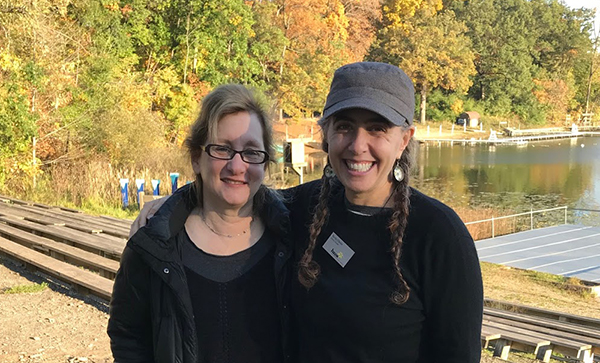Ekar Jewish Urban Farm and Garden Executive Director Sue Salinger, left, with Becky O’Brien, director of Boulder Hazon. (Photo courtesy of Hazon, the Jewish Lab for Sustainability)
Welcome to our Changemaker Profiles blog series! Each edition we profile one outstanding social changemaker from the JVA client community. By sharing the stories of some of the incredible people we get to work with every day, each accomplishing extraordinary work in nonprofits, government, social enterprise and elsewhere, we hope we will bring a little light and inspiration to your day!
For this edition, we spoke with Sue Salinger, executive director of Ekar Jewish Urban Farm and Garden. Denver’s two-acre urban Jewish communal farm and garden, Ekar is dedicated to educating the community about sustainable agriculture practices and food justice and donating fresh, healthy organic produce to local food banks.
1. Tell us about your organization and the social change you are trying to achieve.
“Ekar Farm is part of the movement of Jewish-inspired community farms that works to connect people to where their food comes from, to the earth, and to spiritual practices across religions. Ekar grows food, and we hope to address food equity issues.
“Ekar has been around for nearly a decade. Historically it has educated people about their relationship to food and where it comes from. We’re looking to deepen that work to address inequities in the food system in a systematic way. In 2017 alone, Ekar donated over 18,000 pounds of produce and fruits to vulnerable communities. While directly responding to hunger is so important, it doesn’t necessarily change the root causes of hunger. This year, we went to our partner organizations with a more focused request: If we’re growing food for specific communities, could those participants and members let us know what they’d like to eat? That is, we’re aiming this year at growing culturally specific foods that they might otherwise be unable to find in the ‘usual’ produce donations.
“It’s not that there’s not enough food in Denver. There’s so much food waste. And everyone doesn’t have equal access to all kinds of food. So, we didn’t want to grow 10,000 pounds of zucchini and dump that on them. So we met with Metro Caring, for example, and said: Who do you serve and what produce don’t you get from other sources?”
“According to Metro Caring, a group working on the root causes of hunger, among the people they serve who are food insecure are immigrant communities who have difficulty finding the food from their countries. So this year, we are growing long beans for the Southeast Asian community and sorghum for the African community. And then we met with Kavod, and both they and Metro Caring have a large Russian community among people who are food insecure. So we’re growing beets and cabbage, and cucumbers for pickling. We’re hoping to use the opportunity to bring the larger Ekar learning and volunteer community into more of a relationship with the actual people in need—we can be a meeting ground and sort of a bridge, a place where relationships can be built between these communities.
“As in prior years, We will also have a full slate of growing, preserving and cooking activities. And we are bringing in a lot of school and religious groups to the farm to learn how to grow food, and to grow their connection to the land.”
2. What keeps you inspired and going when things get tough?
“Food comes from the earth. You plant a small seed, you take care of it a tiny bit, and growth and abundance follow. If hail destroys it all, you can replant. So, the abundance of the earth inspires me. We pruned trees last weekend. There’s a quote our educator uses often: ‘Trees really want to produce fruit.’ They can take a lot of neglect, and they provide food anyway.
“One other thing that inspires me is every time we get young children on the farm. We are an educational project, teaching reconnection to nature. When you get a little kid—say, a kindergartener, who has been on screens for years already—it’s amazing how they open up and respond to being outside. When they get that this is where their food comes from—when you see that moment of aha—it’s really worth it.”
3. What advice would you give to someone who is trying to break new ground in a traditional field?

Sue Salinger, executive director of Ekar Jewish Urban Farm and Garden
“Projects like ours—urban and suburban community farms—are really trying to bring an old-fashioned sense of where food comes from to people who have no real experience with it. We’re a hybrid of outdoor education, gardening and experiential education. We’re not a farm per se with growing food as our sole output—we are a bit of a hybrid—a growing garden, of course, for fruits and vegetables; a community center or sanctuary for building human connection in nature; and an outdoor, environmental classroom working on environmental repair.
“So, if you are looking to engage people and create meaning in their lives through outdoor education, connecting communities across difference, providing meaningful experiences around food, or the ancient Jewish wisdom tradition that’s based on the seasons, there’s room for you here. Do a deep dive on whichever aspect interests you, and bring it to the community farming movement. There are a growing number of places looking for urban farmers, outdoor educators, etc., so follow your passion and bring it to the community gardening movement.”
4. What book do you recommend to everyone you meet and why?
“I recommend Dave Jacke’s two books on how to build a food forest (Edible Forest Gardens, Volumes 1 and 2.) He walks you through every concept you need to know about polyculture and perennial food growing.
“For spiritual connection, if you’re a fan of the Old Testament, I recommend Arthur O. Waskow’s Seasons of our Joy: A Modern Guide to the Jewish Holidays. It talks about biblical holidays throughout the year, and it’s applicable to Christians as well as Jews because almost all of our holidays developed out of even older seasonal celebrations. It brings forward that most of our holidays are agricultural, and it includes the deep history of how we have ritualized this. It’s quite a beautiful book.
“Also, Richard Louv’s Last Child in the Woods, on why you need to get kids outside and how to do it. And just for plain old gardening, I like Eliot Coleman; for example, Four-Season Harvest: Organic Vegetables from Your Home Garden All Year Long. There are different ways in America that we think about how to farm, and if you look at a lineage of where we are today, he is an early writer and practitioner and teacher who suggested a different way of farming.”
5. How have you worked with JVA, and how has that helped your organization?
“Ekar had a leadership transition last year, and one of our funders and supporters wanted to help the board make sure they knew how to move forward. Aaron Ney founded Ekar and led it to be a thriving and impactful farm. When he left, it was time to re-evaluate Ekar’s goals, our mission, who we want to serve. So Rose Community Foundation—one of our funders—called in JVA, and Adam came in and led a many-months-long planning project for the board. He took them through funding models and programming models, so by the time the process was finished, the board was ready to move the project forward and take it to its next iteration. All the board members who participated in the planning remain committed.
“If JVA hadn’t come on board, I’m not really sure Ekar would have continued. One of the results of JVA’s work was a business plan that was successfully funded by Rose Community Foundation, a longtime funder of Ekar, and we are very grateful for their support.”
6. What else would you want to share with us that we haven’t asked?
“I had been working for the last five years for Hazon, a national leader in the JOFEE [Jewish, Outdoor Food, Farming and Environmental Education] movement, and one of the outcomes of JVA’s process was that Ekar’s board contracted with Hazon, so I am executive director of the farm for a year. And hopefully much longer!
“We also hired Jen Levy, who was Ekar’s part-time farmer last year. And we have connected with and strengthened relationships between the farm and pantries, synagogues and schools, and we’re getting more active in Denver’s food movement.
“We are making efforts to ensure Denver is a place where food and all other equity issues are being addressed. This year, we are improving a building to make it into classroom space. We have started all of our seeds, through a partnership with The GrowHaus. … And we’re booking tractors and trailers to—hopefully for the last year before we switch to more sustainable methods—till the fields. And we’re refreshing our website and all of our communication vehicles.”
Keep up with the area’s most inspiring changemakers—read JVA’s Changemakers blog!







Leave A Comment